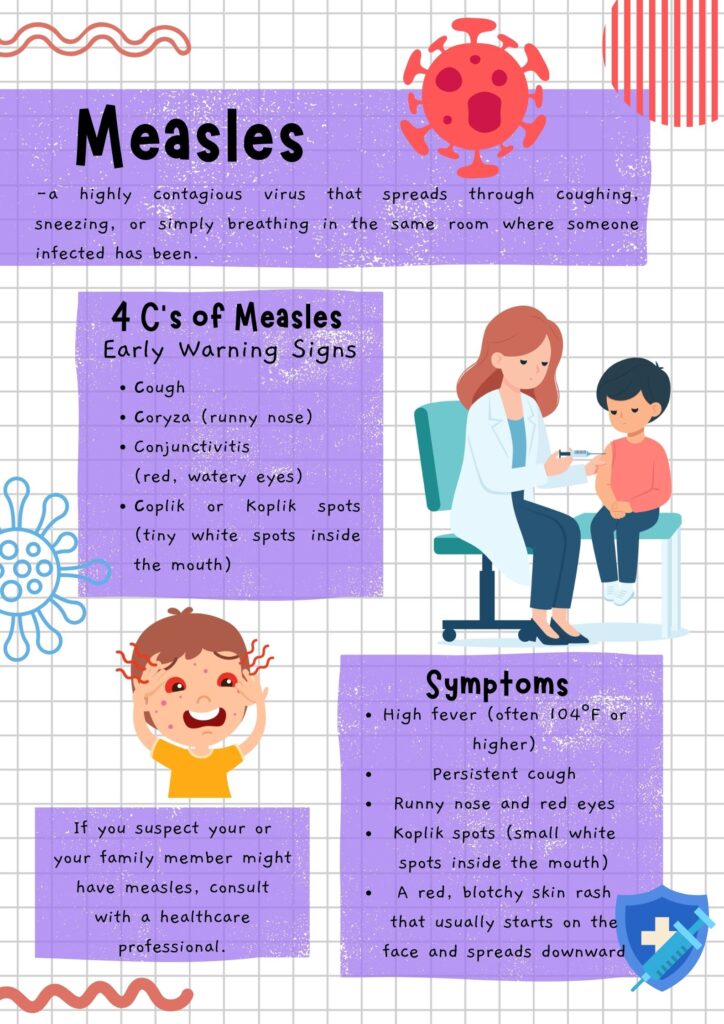If you’ve seen headlines or articles about measles in Texas recently, you’re not alone. For parents across Dallas-Fort Worth, the resurgence of this highly contagious virus raises a lot of questions.
Whether you’re wondering how to spot symptoms, what areas are affected, or when your child needs the vaccine, we’ve gathered the essential facts you need to know.
We’re not doctors, but we’ve sourced information directly from the Centers for Disease Control and Prevention (CDC), World Health Organization (WHO), and Texas Department of State Health Services (DSHS) to give you a clear, medically sound understanding of what’s going on and how to keep your family safe.
If you suspect your or your family member might have measles, consult with a healthcare professional.
What is measles?
Measles is a highly contagious virus that spreads through coughing, sneezing, or simply breathing in the same room where someone infected has been.
It’s caused by a virus from the paramyxovirus family and infects the respiratory tract, but it can affect the entire body.
According to the CDC, measles can lead to serious problems, especially in children under 5, pregnant women, and people with weakened immune systems. These complications include pneumonia, encephalitis (brain swelling), and, in rare cases, death.
The measles virus can linger in the air for up to two hours after an infected person has left a space, which is why it spreads so quickly in public settings like schools, churches, and malls.
What are the 4 Cs of measles?

You may have heard healthcare professionals refer to the “4 C’s” of measles, which is a helpful way to remember some of the early warning signs:
- Cough
- Coryza (runny nose)
- Conjunctivitis (red, watery eyes)
- Coplik or Koplik spots (tiny white spots inside the mouth)
These symptoms usually show up 3 to 5 days before the rash appears. They’re easy to mistake for a common cold or allergy at first, which is why measles often gets passed on before parents even realize it.
More detailed information about these symptoms is available via the World Health Organization.
How long do you quarantine for measles?
If your child or someone in your household has measles or has been exposed to someone who does, it’s crucial to follow proper quarantine guidelines to prevent further spread.
According to the CDC, individuals with measles are considered contagious from 4 days before to 4 days after the rash appears.
The recommended quarantine period for unvaccinated people who’ve been exposed is 21 days from the last potential exposure. This is based on the incubation period of measles, which typically ranges from 7 to 14 days but can extend up to 21. For schools and daycare centers in Texas, local health departments often enforce these quarantine timelines, especially during outbreaks.
What are the symptoms of the measles outbreak in Texas?
The current measles outbreak in Texas is showing the same classic symptoms seen in other outbreaks worldwide. These include:
- High fever (often 104°F or higher)
- Persistent cough
- Runny nose and red eyes
- Koplik spots (small white spots inside the mouth)
- A red, blotchy skin rash that usually starts on the face and spreads downward
What area of Texas has measles outbreaks?
Right now, the measles in Texas outbreak has been concentrated in a few counties, with North Texas seeing some of the most concerning activity. In February and March, Dallas and Collin Counties confirmed multiple cases, including children who had not received their measles-mumps-rubella (MMR) vaccine.
According to the Texas Health and Human Services measles report, other counties with reported cases include Denton, Tarrant, and Harris. The Department is monitoring the situation closely and updating information as new cases are confirmed.
For parents in the DFW area, this means staying alert and making sure your family’s vaccinations are current is especially important right now.
What is the recommended age for the measles vaccine?

Children under the age of five are among the most vulnerable to complications from measles. According to the CDC, about 1 in 5 unvaccinated children who get measles will be hospitalized. Common complications in kids include ear infections, diarrhea, and more serious conditions like pneumonia or brain swelling (encephalitis).
In rare cases, measles can lead to subacute sclerosing panencephalitis (SSPE), a deadly brain disorder that can occur years after infection.
The measles vaccine is part of the MMR vaccine (measles, mumps and rubella). The CDC’s vaccination schedulerecommends:
- First dose: at 12 to 15 months of age
- Second dose: at 4 to 6 years
In some cases, especially during outbreaks, infants as young as 6 months can get an early dose, although it doesn’t count toward the two standard doses. If you’re planning international travel with your child, talk to your pediatrician, as early vaccination is often recommended.
Children who receive both doses of the MMR vaccine are 97% protected against measles, according to the CDC. That’s why vaccination plays such a crucial role in keeping these outbreaks from growing.
If you’re unsure of your child’s vaccination status, your pediatrician can check their immunization records and help schedule any needed doses.
Stay Informed
With measles in Texas making a comeback, particularly in parts of Dallas-Fort Worth, it’s more important than ever for parents to stay informed. Knowing the symptoms, understanding how it spreads, and ensuring your child is up to date on their MMR vaccine are your best tools for protection.
Remember, measles is preventable and treatable. By understanding the signs and acting early, we can protect not only our own families but also our communities.
For more information, trusted resources include:
- Centers for Disease Control and Prevention – Measles
- World Health Organization – Measles Fact Sheet
- Texas DSHS Immunization Unit
Keep your family safe, talk to your healthcare provider, and stay tuned to official updates as the situation changes or evolves. While we’re not doctors, we are here to help Texas parents stay one step ahead.
